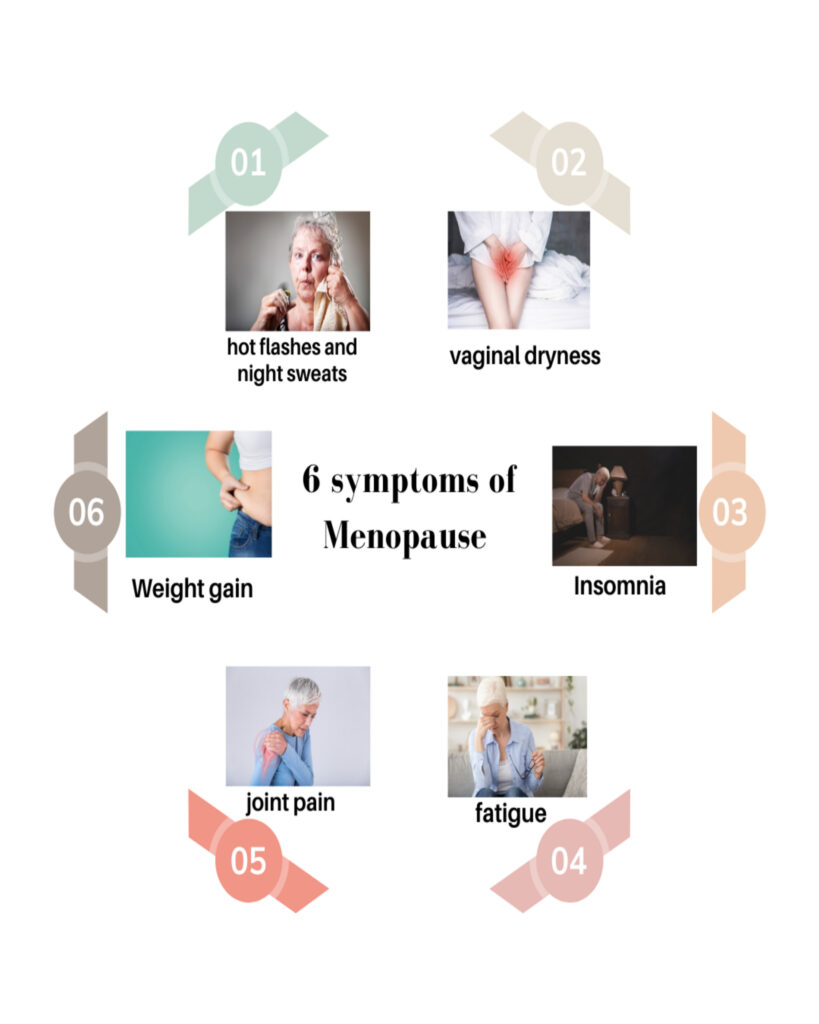Dr Ankita S
MBBS, MS, DNB OBGY
Menopause is a topic that often brings mixed emotions and concerns. It’s a phase of life that marks a significant transition, both physically and emotionally. While it may take an uncertain emotional and physical rollercoaster, Let us encourage ourselves to embrace this transformative journey and see it as an opportunity for growth, empowerment, and celebrating the liberating aspects of menopause.
What is menopause?
It is the cessation of the menstruation period in a woman’s life.The average age range of menopause is estimated to be between 47 to 51 years old. The menopause transition is experienced by 1.5 million women each year and often involves troublesome symptoms, including
- hot flashes and night sweats
- vaginal dryness
- Insomnia
- fatigue
- joint pain.
- Weight gain
The onset of menopause is indicated by the absence of menstruation for a continuous 12-month period.
Menopause,perimenopause and premenopause are the different stages of menopause in a woman’s life. During these stages there are great fluctuations in the hormones.
Perimenopause usually starts in the mid 40’s and the average age for menopause is between 47-51. But naturally, the menopause phase differs for every woman.
Premenopause is the phase where no symptoms appear. It usually starts in the late 30’s and early 40’s. During this time hormonal changes start in the body preparing for menopause but with no visible symptoms.

What is perimenopause?
It is the time just before menopause. This is the most significant phase with clear visible symptoms. The symptoms occur when the level of estrogen and sex hormones decreases. Some Healthcare professionals call this as “menopause transition”.
The common symptoms includes
- Irregular or abnormal menstruation (that may be lighter or heavier)
- Night sweats and hot flashes
- Tender breasts
- Weight gain
- Headache
- Constipation
- Hair thinning
- Tachycardia
- Problems in conceiving
- Mood swings, depression and anxiety
Menopause can cause perimenopausal symptoms to persist, however they might start to get worse as the transition approaches. Oestrogen levels generally decline during the course of the perimenopause, which typically lasts 8-10 years.
What is premenopause?
What are the reasons for early menopause?
Roughly 5% of women experience early menopause before reaching their 40s.. This is due to loss of normal functioning of the ovaries(premature ovaries). Early menopause is also called ‘Premature menopause,but sometimes the actual cause is unknown. Anything that damages or stops your ovaries from producing estrogen may lead to menopause. Women with early menopause may require hormonal treatments to prevent certain health problems like osteoporosis and cardiovascular diseases. Some reasons for early menopause are:
- Habit of smoking
- Genetics
- Chemotherapy
- Autoimmunity
- Chromosome defects
Importance of self care during menopause
Menopause is an ideal time to prioritise self-care and well-being. Embracing newfound passions and interests in menopause. Take the opportunity to listen to your body’s needs and nurture yourself both physically and emotionally.
The PCOS journey can be exhausting and is an emotional rollercoaster. Dealing with it can be stressful where women face depression, insomnia, weight gain and anxiety.Prioritizing self-care not only helps alleviate symptoms but also enhances your overall well-being during this transformative phase.
Consulting a doctor to ease the symptoms, especially depression and insomnia is crucial in the treatment of Polycystic ovarian syndrome.
Why is it important to accept change and embrace it in every way?
Different diets and supplements to be taken during menopause:
Best herbs for menopause –
- Ashoka (Saraca indica)
- Shatavari
- Brahmi
- Ashwagandha
- Turmeric
- Ginger
Vitamins for hair loss menopause-
Vitamin A,D,B complex
Certain herbs, namely aloe vera, black cohosh, dong quai, and shatavari, have been recognized for their potential in addressing vaginal dryness. It’s important to note that these herbs are typically consumed orally, with the exception of aloe vera. However, caution should be exercised when considering shatavari, especially if an individual is concurrently taking medications, as there is a possibility of interactions that could impact the effectiveness of those medications. As with any health-related decision, consulting a healthcare professional before incorporating these herbs into one’s regimen is advisable to ensure both safety and optimal outcomes.
The importance of education in empowering women through menopause
Knowledge is power when it comes to menopause. Educate yourself about the changes. Let go of societal expectations and embrace menopause as a new chapter.By being informed, you can make empowered decisions that align with your personal needs and preferences.
It is important to understand that menopause is not a flaw or a burden. Society may perpetuate stereotypes and misconceptions, but you have the power to reclaim your narrative. Embrace it! Celebrate your achievements and the unique path you have walked thus far!
Take time to nurture yourself, both physically and emotionally.
Arm yourself with knowledge to make informed decisions about your well-being and explore the various options available to alleviate symptoms if needed.
Invest in your personal growth. By doing so, you will rediscover your identity beyond reproductive capabilities and redefine what it means to be a woman.
Menopause is not an ending; it is a glorious new beginning.
Embrace it, Embrace yourself.
Conclusion
As we conclude this exploration of menopause, let us remember that this phase marks a new beginning—an opportunity to prioritize self-care, personal growth, and holistic well-being. By celebrating menopause, we pave the way for a brighter and more empowered future for all women. So, let us embrace this transformative journey with open hearts, empowering each other to navigate menopause with strength, resilience, and a profound sense of self-worth.
To support you on this journey, we encourage you to seek guidance from medical professionals and experts who specialize in menopause and women’s health. If you have any questions or concerns about your menopause experience, consider consulting with a knowledgeable healthcare provider. You can find a wealth of information and connect with certified healthcare practitioners https://cystercare.com/pcos-specialist/ . Their expertise will provide you with personalized insights and guidance tailored to your unique needs.
For more resources and a community of individuals experiencing similar transitions, we invite you to explore our Page. Here https://cystercare.com/ , you’ll find a supportive network, articles, and discussions that celebrate every phase of womanhood. Together, we can create a world where women embrace menopause as a testament to the beauty of life’s continuous evolution.
Remember, this journey is one of growth and empowerment, and you’re not alone. Let’s move forward with confidence, embracing the changes that come with menopause and living our lives to the fullest.
References
1.Speroff, L., Barnhart, K., & Gonzalez, J. (2007). The Menopause: A Signal for the Future.
2.Ishak, N. N. M., Jamani, N. A., Arifin, S. R. M., Hadi, A. A., & Abd Aziz, K. H. (2021). Exploring women’s perceptions and experiences of menopause among East Coast Malaysian women. Malaysian Family Physician: the Official Journal of the Academy of Family Physicians of Malaysia, 16(1), 84.
3. Mckinlay, S. M. (1996). The normal menopause transition: an overview. Maturitas, 23(2), 137-145.
4.Matthews, K. A. (1992). Myths and realities of the menopause. Psychosomatic medicine, 54(1), 1-9.
Frequently Asked Questions
Dr Ankita S
MBBS, MS, DNB OBGY
Varshini
M.Tech Food Biotechnologist
Varshini
M.Tech Food Biotechnologist
Related Blogs
- Embracing menopause: a new chapter in your womanhoodAugust 22, 2023
- Menstrual Flow Colors: Decoding What They MeanAugust 17, 2023
- why you might have irregular periodsSeptember 30, 2022






